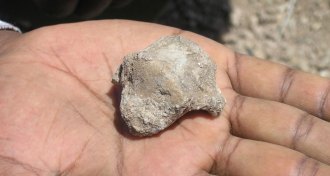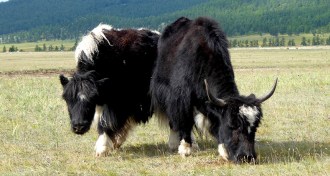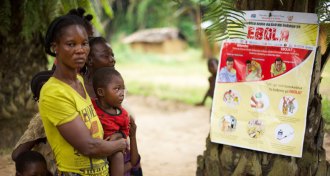Humans
Sign up for our newsletter
We summarize the week's scientific breakthroughs every Thursday.
-
 Health & Medicine
Health & MedicineWith its burning grip, shingles can do lasting damage
Varicella zoster virus, which causes chickenpox and shingles, may instigate several other problems.
-
 Animals
Animals‘Mama’s Last Hug’ showcases the emotional lives of animals
In ‘Mama’s Last Hug,’ Frans de Waal argues that emotions occur throughout the animal world.
By Erin Wayman -
 Life
LifeReaders ponder mitochondria, Neandertal diets, deep sea corals and more
Readers had questions about mitochondrial DNA, Neandertal diets, deep ocean corals and more.
-
 Archaeology
ArchaeologyAncient Angkor’s mysterious decline may have been slow, not sudden
Analyzing sediment from the massive city’s moat challenges the idea that the last capital of the Khmer Empire collapsed suddenly.
By Bruce Bower -
 Health & Medicine
Health & MedicineThe FDA says don’t buy young plasma therapies. Here’s why
Infusions of plasma from young people may hold the secret of youth, but there’s not much evidence to support the idea yet.
-
 Anthropology
AnthropologyAfrican hominid fossils show ancient steps toward a two-legged stride
New Ardipithecus ramidus fossils reveal how hominids were shifting toward humanlike walking more than 4 million years ago.
By Bruce Bower -
 Health & Medicine
Health & MedicineA ban on artificial trans fats in NYC restaurants appears to be working
New Yorkers’ levels of artificial trans fats dropped, especially in people who ate out the most, after a citywide ban on the fats in restaurant foods.
-
 Chemistry
ChemistryWhy kids may be at risk from vinyl floors and fire-resistant couches
Children from homes with all vinyl floors and flame-retardant sofas show higher levels of some synthetic chemicals in their bodies than other kids.
-
 Archaeology
ArchaeologyTooth plaque shows drinking milk goes back 3,000 years in Mongolia
The hardened plaque on teeth is helping scientists trace the history of dairying in Mongolia.
-
 Psychology
PsychologySTEM professors’ beliefs on intelligence may widen the racial achievement gap
Seeing intelligence as fixed can result in lower grades, especially for certain minorities
By Bruce Bower -
 Climate
ClimateClimate change could increase foodborne illness by energizing flies
Warmer, more lively house flies could spread more Campylobacter bacteria by landing on more food.
By Susan Milius -
 Health & Medicine
Health & MedicineCongo’s Ebola outbreak is a testing ground for new treatments
The first multidrug clinical trial of Ebola treatments is underway amid an outbreak in Congo.